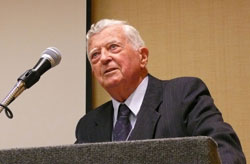Posts tagged ludzie
Zmarł Bill Stoeger SJ, członek Obserwatorium Watykańskiego
0
Fr. Bill Stoeger, SJ (May 10, 1943 – March 24, 2014)
Bill Stoeger was a staff scientist for the Vatican Observatory Research Group in Tucson, specializing in theoretical cosmology, high-energy astrophysics, and interdisciplinary studies relating to science, philosophy and theology. The eight volumes of the Vatican Observatory and the Center for Theology and the Natural Sciences series on „God’s Action in the World” attest magnificently to this broad-based work.
Żródło: Obserwatorium Watykańskie
Odszedł wybitny genetyk o. Luis Archer SJ
0Father Luis Archer passed away in Lisbon last October 8th . He was a pioneer on the genetics field and former President of the Ethics National Council for Sciences of Life. He was born at Oporto 85 years ago, being Jesuit along 64 years.
Luis Archer was a brilliant scientist and a great man of faith. He taught molecular genetics in 13 different universities being distinguished with the National Award 2004 in Bioethics. He also published 250 scientific articles about Bioethics and molecular genetics, coordinated four important works and wrote more than six books.
In a time where bioethics assumes an undeniable importance and claims for a fruitful dialogue involving people and knowledge, Father Luis Archer was a respected voice by the scientific community, specially during his Presidency of the Ethics National Council for Sciences of Life (1996-2001). The dialogue between science and faith became so natural and easy with him. In fact, everything is far from being so tangible and expressible as one is wishing us to believe…
Photo: University of Porto
Martin Rees – 2011 Templenton Prize Winner
0Martin J. Rees, a theoretical astrophysicist whose profound insights on the cosmos have provoked vital questions that speak to humanity’s highest hopes and worst fears, has won the 2011 Templeton Prize.

Photo: Cambridge University
Rees, Master of Trinity College, one of Cambridge University’s top academic posts, and former president of the Royal Society, the highest leadership position within British science, has spent decades investigating the implications of the big bang, the nature of black holes, events during the so-called ‘dark age’ of the early universe, and the mysterious explosions from galaxy centers known as gamma ray bursters.
In turn, the “big questions” he raises – such as “How large is physical reality?” – are reshaping crucial philosophical and theological considerations that strike at the core of life, fostering the spiritual progress that the Templeton Prize has long sought to recognize.
Source: Templeton Foundation
Po polsku: Deon.pl
Umarł ks. prof. Ernan McMullin
0Fr. Ernan McMullin (1924-2011)

Ernan McMullin died on Feb 8th in his home county of Donegal, Ireland. Ernan McMullin was previously the O’Hara Professor of Philosophy Emeritus at the University of Notre Dame, US. An internationally respected philosopher of science, Prof. McMullin was also a specialist on the life and writings of Galileo. He has written and lectured extensively on subjects ranging from the relationship between cosmology and theology, to the role of values in understanding science, to the impact of Darwinism on Western religious thought.
Photo source: Pittsburgh Center for Philosophy of Science
More on Wikipedia
Rok Rudjera Boškovica SJ, fizyka i astronoma
0CROATIA: The Year of Boškovic sponsored by the Parliament

Honoring the 300th anniversary of the birth of the great Croatian scholar and Jesuit Rudjer Boškovic, the Croatian Parliament is proclaiming the year 2011 as the Year of Rudjer Boškovic at the national level. The Jesuit, who was born in Dubrovnik in 1711 and died in Milan in 1787, apart from being an astronomer and physicist (he is famous for his atomic theory), was also a philosopher, theologian, mathematician, diplomat and poet.
Among the events planned for 2011 is an international congress organized by our Faculty of Philosophy in Zagreb to be held in November 2011.
Photo and More: Wikipedia
Werner Arber prezesem Papieskiej Rady Nauk
0Laureat Nagrody Nobla w dziedzinie fizjologii i medycyny w 1978 r., pochodzący ze Szwajcarii Werner Arber został mianowany przez papieża Benedykta XVI prezesem Papieskiej Akademii Nauk. Po raz pierwszy na jej czele stanie naukowiec, nie będący członkiem Kościoła rzymsko-katolickiego. Mikrobiolog i genetyk Werner Arber należy do Kościoła reformowanego.

Urodzony 3 czerwca 1929 roku w Gränicher w Szwajcarii Werner Arber otrzymał wraz z Hamiltonem O. Smithem i Danielem Nathanswem 1978 roku Nagrodę Nobla w dziedzinie medycyny za odkrycie enzymów restrykcyjnych i ich zastosowanie w genetyce molekularnej. Jest członkiem Papieskiej Akademii Nauk od 1981 r. a do jej Rady należy od 1995 r.
Papieska Akademia Nauk (łac. Pontificia Academia Scientiarum), istnieje od ponad 400 lat. Jest to towarzystwo naukowe, do którego należą powołani przez papieży wybitni przedstawiciele nauk matematycznych i przyrodniczych z różnych państw – w sumie 80 osób. Obok prof. Arbera członkami Papieskiej Akademii jest ponad 20 innych laureatów Nagrody Nobla. Dobór naukowców pracujących dla Akademii dokonywany jest wyłącznie w oparciu o ich zasługi naukowe i etyczne, niezależnie od kraju pochodzenia czy wyznania. Jest wśród nich trzech Polaków: ks. prof. Michał Heller – fizyk, kosmolog i filozof nauki z Uniwersytetu Papieskiego Jana Pawła II w Krakowie, Andrzej Szczeklik – profesor Kliniki Chorób Wewnętrznych Uniwersytetu Jagiellońskiego oraz matematyk, prof. Czesław Olech z Instytutu Matematyki Polskiej Akademii Nauk. Przez wiele lat w prezydium Akademii zasiadał zmarły w 2002 roku matematyk, prof. Stanisław Łojasiewicz .
Źródło: Deon.pl
Zdjęcie: wikipedia
Autobiografia: nobelprize.org
